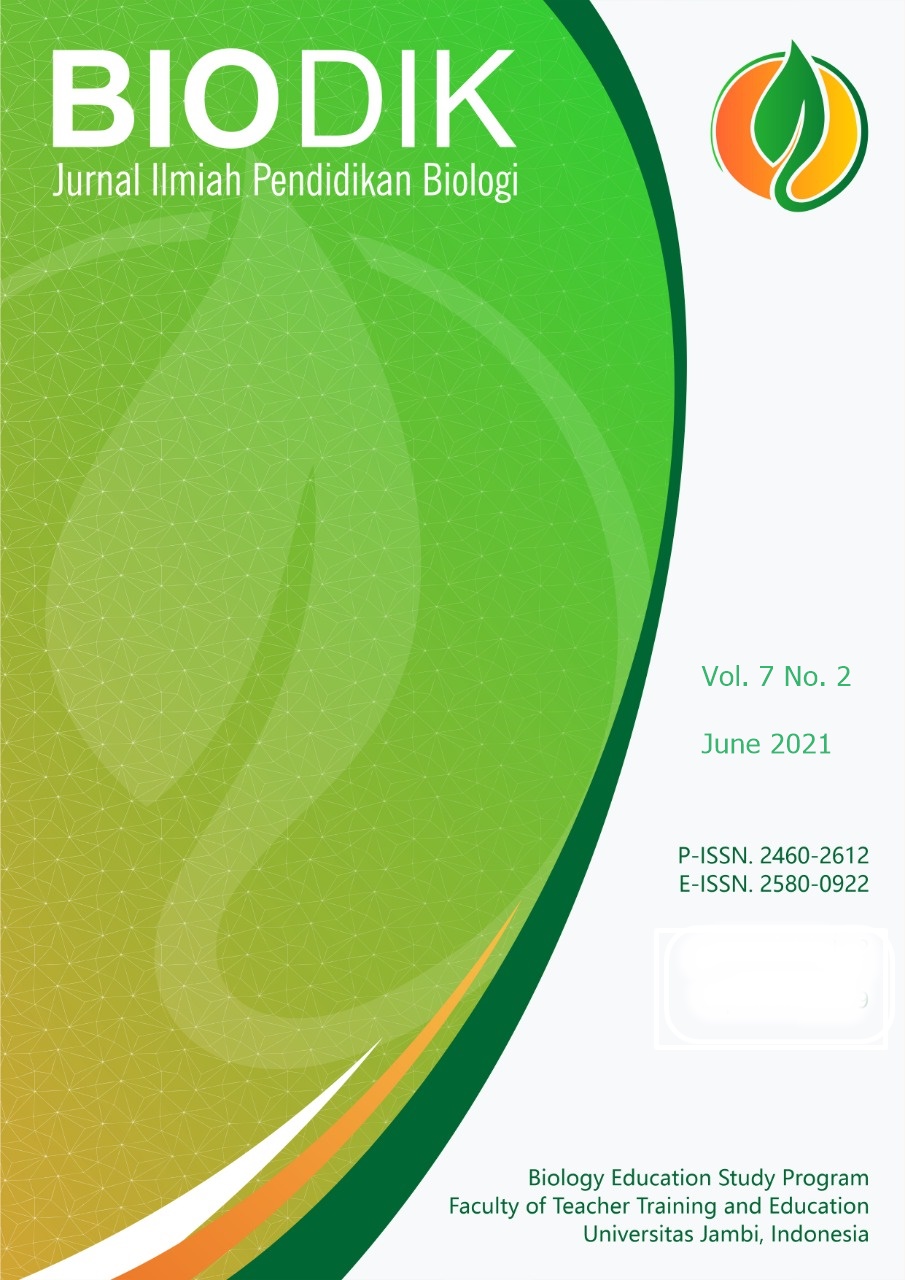Peranan Self Efficacy dan Self Regulated Learning Terhadap Prestasi Akademik Mahasiswa
(The Role of Self Efficacy and Self Regulated Learning on Student Academic Achievement)
DOI:
https://doi.org/10.22437/bio.v7i2.12824Abstract
This research is an ex post facto type. Aim to: analyze the effect of self-regulated learning and self-efficacy on the academic achievement of students of the Biology Education Study Program, Muhammadiyah University of Makassar. The population in this study were all students of the Biology Education Study Program, Muhammadiyah University of Makassar. The research sample of 46 students was obtained using purposive sampling technique. The variables studied consisted of two independent variables, namely self-efficacy (x1) and self-regulated learning (x2) and one dependent variable, namely academic achievement (y). Data collection techniques through questionnaires to obtain self-regulated learning and self-efficacy data, for academic achievement data obtained through documentation techniques. The results of data analysis indicate that the correlation between self-efficacy and self-regulated learning and academic achievement has a very strong relationship. It can be concluded that self efficacy and self regulated learning play an important role in student academic achievement. Students who have high self-efficacy and self-regulated learning will be able to adapt well to academic activities in fairly dense tertiary institutions. So that it will help students to achieve brilliant academic achievements.
Abstrak.
Mahasiswa secara mandiri memantau perkembangan kegiatan akademiknya, seperti nilai-nilai dari mata kuliah dan tugas yang diberikan. Mahasiswa yang mampu beradaptasi secara cepat dengan proses pembelajaran di perguruan tinggi tentu akan dapat menjalani aktivitas akademik yang cukup padat dengan baik. Untuk itu mahasiswa perlu memiliki self regulated learning dan self efficacy yang baik. Oleh karena itu penelitian ini bertujuan untuk menganalisis pengaruh self regulated learning dan self efficacy terhadap prestasi akademik mahasiswa Prodi Pendidikan Biologi Universitas Muhammadiyah Makassar.  Penelitian ini berjenis ex post facto. Populasi dalam penelitian ini adalah seluruh mahasiswa Prodi Pendidikan Biologi Universitas Muhammadiyah Makassar. Teknik pengumpulan data menggunakan kuesioner. Teknik analisis data menggunakan uji regresi linear berganda. Hasil analisis data yang menunjukkan bahwa korelasi antara self efficacy dan self regulated learning dengan prestasi akademik memiliki hubungan yang sangat kuat. Dapat disimpulkan bahwa self efficacy dan self regulated learning berperan penting terhadap prestasi akademik mahasiswa. Mahasiswa yang memiliki self efficacy dan self regulated learning yang tinggi akan mampu beradaptasi dengan baik dalam kegiatan akademik di perguruan tinggi yang cukup padat. Sehingga hal tersebut akan membantu mahasiswa untuk meraih prestasi akademik yang gemilang.
Downloads
References
Afnan. (2020). Hubungan Efikasi Diri dengan Stress Pada Mahasiswa yang Berada dalam Fase Quarter Life Crisis. Jurnal Kognisia.
Amir. H. (2016). Korelasi Pengaruh Faktor Efikasi Diri dan Manajemen Diri Terhadap Motivasi Berprestasi Padamahasiswa Pendidikan Kimia Unversitas Bengkulu. Manajer Pendidikan.
Anisa, A., & Ernawati, E. (2018). PENGARUH PROKRASTINASI AKADEMIK TERHADAP HASIL BELAJAR BIOLOGI SISWA SMA NEGERI DI KOTA MAKASSAR. Jurnal Biotek. https://doi.org/10.24252/jb.v6i2.6256
Arikunto, S. (2002). Metodologi Penelitian Suatu Pendekatan Proposal. 2017.
Barry J. Zimmerman, & Scunk, D. H. (2011). Handbook of Self Regulation of Learning and Performance (1st ed.). Routledge Taylor and Francis Group.
Husna, A. N., Hidayati, F. N. R., & Ariati, J. (2014). REGULASI DIRI MAHASISWA BERPRESTASI. Jurnal Psikologi Undip. https://doi.org/10.14710/jpu.13.1.50-63
Kusrieni, D. (2014). HUBUNGAN ANTARA KONSEP DIRI AKADEMIK,EFIKASI DIRI AKADEMIK, HARGA DIRI DANPROKRASTINASI AKADEMIK PADA SISWA SMPNEGERI DI KOTA MALANG. PSIKOPEDAGOGIA, 3(2), 100–111. https://core.ac.uk/download/pdf/295348711.pdf
Mahmudi, M. H., & Suroso. (2014). Efikasi Diri,Dukungan SosialDan Penyesuaian DiriDalam Belajar. Persona, Jurnal Psikologi Indonesia, 3(2), 183–194. http://jurnal.untag-sby.ac.id/index.php/persona/article/view/382/340
Manab, A. (2016). Memahami regulasi diri: Sebuah tinjauan konseptual. Psychology Humanity.
Permana, H., Harahap, F., & Astuti, B. (2017). HUBUNGAN ANTARA EFIKASI DIRI DENGAN KECEMASAN DALAM MENGHADAPI UJIAN PADA SISWA KELAS IX DI MTS AL HIKMAH BREBES. Hisbah: Jurnal Bimbingan Konseling Dan Dakwah Islam. https://doi.org/10.14421/hisbah.2016.132-04
Rachmah, D. N. (2015). Regulasi Diri dalam Belajar pada Mahasiswa yang Memiliki Peran Banyak. Jurnal Psikologi. https://doi.org/10.22146/jpsi.6943
Rustika, I. M. (2016). Efikasi Diri: Tinjauan Teori Albert Studi, Program Fakultas, Psikologi Universitas, Kedokteran. Buletin Psikologi.
S.Endler, N., & L.Kocovski, N. (2000). Self-Regulation and Distress in Clinical PsychologyS.Endler, N., & L.Kocovski, N. (2000). Self-Regulation and Distress in Clinical Psychology. In Handbook of Self-Regulation (pp. 569–599). Elsevier Inc. https://www.sciencedirect.com/science/article/pii/B9. In Handbook of Self-Regulation (pp. 569–599). Elsevier Inc. https://www.sciencedirect.com/science/article/pii/B9780121098902500469
Sugiyono. (2012). Metode Penelitian Kuantitatif, Kualitatif dan R & D.Bandung:Alfabeta. Metode Penelitian Kuantitatif, Kualitatif Dan R & D.Bandung:Alfabeta. https://doi.org/10.1017/CBO9781107415324.004
Widyaninggar, A. A. (2015). Pengaruh Efikasi Diri dan Lokus Kendali (Locus of Control) Terhadap Prestasi Belajar Matematika. Formatif: Jurnal Ilmiah Pendidikan MIPA. https://doi.org/10.30998/formatif.v4i2.143
Downloads
Published
Versions
- 2020-06-02 (2)
- 2021-06-02 (1)
How to Cite
Issue
Section
License
Copyright (c) 2021 Anisa, Nurul Magfirah, Rahmatia Thahir

This work is licensed under a Creative Commons Attribution-NonCommercial-ShareAlike 4.0 International License.
Copyright Notice
Authors who publish with Biodik : Jurnal Ilmiah Pendidikan Biologi agree to the following terms:
- For all articles published in Biodik : Jurnal Ilmiah Pendidikan Biologi, copyright is retained by the authors and grant the journal right of first publication with the work simultaneously licensed under a Creative Commons Attribution-ShareAlike 4.0 International Licensethat allows others to share the work with an acknowledgment of the work's authorship and initial publication in this journal.
- Authors are able to enter into separate, additional contractual arrangements for the non-exclusive distribution of the journal's published version of the work (e.g., post it to an institutional repository or publish it in a book), with an acknowledgment of its initial publication in this journal.
- Authors are permitted and encouraged to post their work online (e.g., in institutional repositories or on their website) prior to and during the submission process, as it can lead to productive exchanges, as well as earlier and greater citation of published work (See The Effect of Open Access).
















